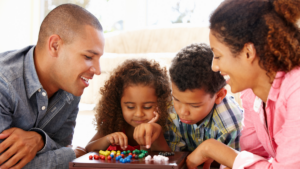Digital Detox: Helping Teens Unplug in a Virtual World
Young people are spending more time in front of their screens than ever, but how do you help them find...
February 11, 2025

Healthy communication in the family system is incredibly important, yet sometimes it can feel hard to achieve. However, with practice and openness to new methods, you can achieve better communication in your family! There are several tips that family therapists recommend, such as encouraging regulation, evaluating parenting style, and creating an open environment. But what does that look like practically?
Famous psychiatrist Dr. Bruce Perry teaches us that we must work to regulate (manage our emotions) before we can relate and reason with a child. This process must be done in this order because a child is unable to process through information if they are dysregulated. However, a parent cannot co-regulate with their child if they, themselves, are dysregulated. So, practice your own regulation skills first— this will also be great modeling for your child!
Often, parents in family therapy talk about their upbringing and how this has impacted the way they raise their children. Many parents grew up in a time where children were “seen and not heard.” This mentality can be damaging to the child’s sense of value in the family system and does not usually lead to healthy modes of communication as a whole. Parents must reflect on the way they were raised and truly evaluate whether those same parenting strategies work with their child.
But how do you maintain authority in the home, while also ensuring that your child feels valued and heard? By establishing clear family rules and expectations, confusion or power struggles with your child will be minimized. When a child is acting out, it is important that the parent names the behavior as unacceptable and informs them of the consequence they will receive, should they choose to continue. Then walk away and allow for them to make a choice. If they choose to engage further, the consequence is clear. Remember to be mindful of the energy you give when discussing negative and positive behaviors. Be sure to name positive behaviors often and reward your child when they are doing well. Solely giving attention to negative behaviors can often lead to a different set of issues.
When in conversation, remember to listen to learn, not to respond. Too often when arguments arise, people begin to think about their own response before the other person has finished speaking. It is helpful when parents model the ability to take feedback. In these moments you must lower your defenses, creating a space that is open to multiple perspectives. Avoid using absolutes such as “you never do____” or “you always____.” Instead, describe what the situation feels like to you. For example, “I feel ___ when you do____.” This method will promote honest and healthy communication, centered around relationship building.
The core of healthy family communication is the interest and effort in understanding one another. These tips take practice and patience— remember that results may not be seen overnight. However, with a genuine dedication to grow, your family can begin to communicate better with one another day by day.
Young people are spending more time in front of their screens than ever, but how do you help them find...
February 11, 2025
It’s back-to-school time during a year like no other. Beyond the typical nervousness and anxiety that may come with starting...
August 24, 2021
Our coworkers help our kids become more independent. Through career workshops, life-skills training, and financial-literacy programs, our boys and girls...
June 4, 2021